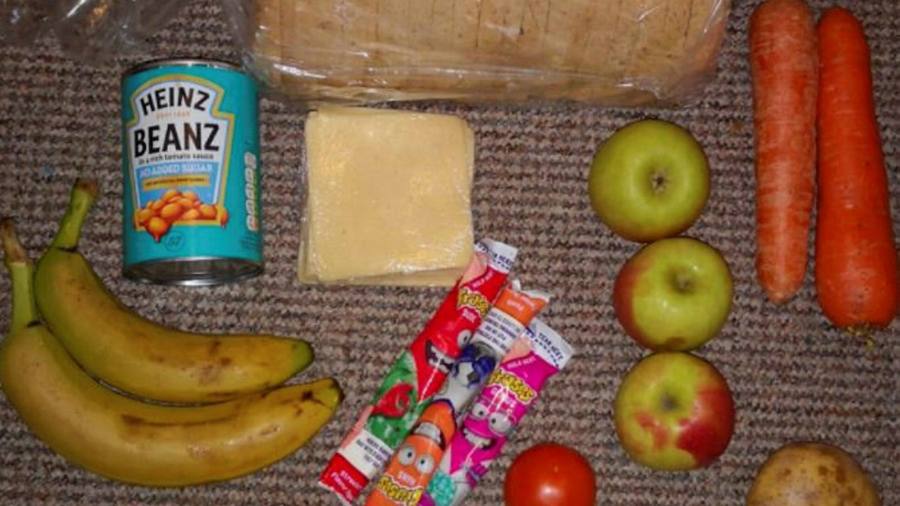[ad_1]
Crisis communications can be tricky. How, for example, to handle raising profitability guidance just three weeks after a media firestorm around alleged profiteering from disadvantaged children?
Compass gave us one of the most memorable images of the pandemic: a lunchtime support parcel from its Chartwells school catering subsidiary, including two bruised bananas, a tin of baked beans and a solitary tomato. The meagre fare drew criticism from across the political spectrum.
And while markets seemed impassive to each day’s headlines, remaining steady was not enough: Compass’ shares have underperformed French peer Sodexo by 10 per cent in the year to date.
In between apologies, Chartwells boss Charlie Brown blamed supply-chain issues for a few hundred sub-par deliveries in the first week of lockdown. His company pledged last month to make no profit from home rations, with schools not billed for substandard packages and parents able to voice their concerns via a free helpline.
Compass made a point of highlighting these damage limitation efforts on Thursday, even though reparations hardly registered at group level. Covid-19 meant organic sales for the three months ending December fell by more than a third, but cost savings and contract rejigs helped nudge margins above the previous 2.5 per cent target by a fifth of a percentage point. Guidance for the current quarter flagged a further sequential margin improvement of up to 1 percentage point. All in all, it will be worth about £50m in extra earnings for the company’s half year ending in March.
Dominic Blakemore, Compass chief executive, wants to see underlying margins back to 7 per cent even before revenues fully recover. Restoring profitability takes precedence as Compass adjusts to a future of quieter workplaces and public spaces. Yet extracting costs is easy when trade is slow; the stress test comes when it picks back up. Contract retention has remained strong at 96 per cent but is an imperfect lead indicator, since few clients will be in a hurry to tender for new catering while their customers are stuck at home and their staff are locked out.
While contract wins from weakened competitors offer some scope for upgrades, Compass’s organic growth has tended to track global GDP and unemployment rates. All that’s in its power for the moment is to improve profitability — with the Chartwells fiasco providing a timely reminder of what can happen if standards slip.
Barbarians at the pumps
Less than two years have passed since the Competition and Markets Authority blocked the proposed merger of Sainsbury and Asda, deciding among other things that competition would be lessened at 125 locations where their petrol stations overlapped.
The CMA is now examining the leveraged buyout of Asda where ownership of its petrol stations will be hived off to the Issa brothers, the deal’s architects, whose EG Group has around 340 UK forecourts. If the regulator thinks local competition will be similarly affected, will the fiendishly complicated deal still hold together?
One to watch
If you own a watch worth more than $10,000 it was almost certainly made in Switzerland, writes Andrew Whiffin.
With high-end horology a natural monopoly and a conservative industry, tight supplies were compounded last year by disruption from the pandemic. Demand held at record levels and shares in UK-listed retailer Watches of Switzerland have soared. Its sales in the three months to January were 6 per cent higher than the year before despite a 50 per cent fall in shop-trading hours, the group said on Thursday.
Customers have taken to browsing online, with ecommerce sales in the group’s main UK market more than doubling during the period. The Patek Philippe brand temporarily allowed online purchases through selected dealers, including Watches of Switzerland — and it is close relationships with manufacturers that help underpin the retailer’s operating model and its ambitions for growth.Â
With digitalisation proving a threat to the Swiss watch industry, the relationship between producers and sellers has become increasingly important. Watchmakers want retailers who can minimise the amount of new product finding its way onto secondary markets at inflated prices. Watches of Switzerland claims its superior customer relationships help stem the resale problem.
City Bulletin
Sign up to the City Bulletin newsletter for the latest company news. Every morning our UK equities reporter Bryce Elder covers the biggest business stories and delivers them straight to your inbox by 8am UK time.
International growth relies on maintaining friendly relations both with customers and suppliers. Sales in the US rose by almost a fifth in the latest quarter. Watches of Switzerland has been pursuing a roll-up strategy in the highly fragmented market as well as expanding its own network of stores. That will help the group achieve sales of £820m for the full year to March, growing to £1.1bn by 2022, according to analysts’ consensus.Â
High expectations have wound the stock higher by more than 140 per cent from its 2019 flotation price. The shares now trade at 22 times two-year forward earnings, up from 13 at the time of the IPO. The valuation is looking stretched but as an investment, the shares are still easier to come by than a new Rolex.
Compass; CMA/Asda: bryce.elder@ft.com
Watches of Switzerland: andrew.whiffin@ft.com
[ad_2]
Source link






